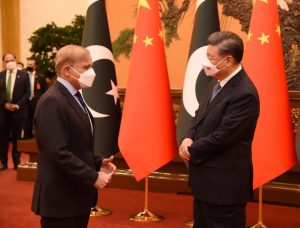Prime Minister Shehbaz Sharif’s visit to China on November 1-2, which was aimed at putting the China-Pakistan Economic Corridor (CPEC), a flagship of Beijing’s Belt and Road Initiative (BRI), back on track, seems to have achieved its objective.
During the visit, Chinese President Xi Jinping assured Sharif that China would “inject new impetus” into the strategic cooperative partnership. In what appears to be a key highlight of Sharif’s trip, Xi also promised Pakistan support in stabilizing its financial situation.
Xi’s statements are encouraging as Pakistan has requested China to roll over its $6.3 billion in debts that are set to mature in the coming months. This will provide much relief to Pakistan, which is in the grip of a serious economic crisis.
During Sharif’s visit to Beijing, the two countries signed agreements covering a “broad range” of areas. They agreed to enhance cooperation on CPEC, including pushing its expansion to Afghanistan. In addition, they decided to launch a $10 billion high-speed rail project linking Karachi to Peshawar. Sharif’s office described it as “a project of strategic importance” under CPEC. Beijing has also agreed to “export technology for a 160 km/hour high-speed railway train to Pakistan.” This is the first time that China will be exporting this technology to any country.
Xi told Sharif that the development of Gwadar Port, a flagship project of CPEC, should be accelerated and “conveyed his hope that Pakistan will provide a reliable and safe environment for Chinese institutions and personnel working on cooperation projects.”
It is pertinent to mention here that security cooperation between the two countries entered a new phase following the killing of three Chinese teachers in Karachi in April by a Baloch militant group.
A team of Chinese officials traveled to Pakistan following the incident to assist with investigations. Cooperation of this sort has not been reported before. “The Chinese officials supported Pakistan’s counter-terrorism forces in areas such as CCTV footage enhancement and data retrieval from cell phones,” according to a Reuters report. The team spent around two months in Pakistan and the leads they found helped Pakistan arrest the main suspect in the Karachi attack in July. Reportedly, the arrest of the key suspect led to numerous other arrests of Baloch militants across Pakistan and elsewhere.
There has been a visible decline in attacks on Chinese interests in Pakistan over the last few months. It is expected that Pakistan and China’s counterterrorism cooperation will further deepen in the coming weeks and months, particularly to secure investments and personnel associated with CPEC.
At this stage neither Pakistan nor China wants security issues to disrupt CPEC’s pace, particularly projects being carried out in Balochistan as CPEC’s real potential lies in that southern province. Balochistan is impoverished and restive, and the province’s development under CPEC not only has the potential to neutralize the appeal of Baloch militant groups but also to materialize CPEC’s expansion into Afghanistan and beyond.
Since Sharif came to power in April this year, there has been a visible urgency in Pakistan to put CPEC back on track. Efforts were made to address Chinese concerns relating to delays in project implementation, repayment of loans, and security issues in Pakistan.
Ahead of Sharif’s visit to China, his government stated that progress on CPEC projects slowed down during the tenure of his predecessor, Imran Khan. During his meeting with Chinese investors in Beijing earlier this week, Sharif said that he was “aware that there have been many problems in the past for which we apologize but after assuming power on April 11, 2022, we have solved the majority of the problems.” Around “160 billion rupees [$200 million] owed to Chinese companies have been paid and a revolving fund has been created from 50 billion rupees by the State Bank,” he said.
Among other things, Sharif’s visit to China cements the impression that Beijing remains committed to investing in Pakistan. However, there is a lot that Islamabad needs to sort out on administrative and financial matters to meet Chinese expectations and work pace.
As the financial crunch deepens in Pakistan, the sense of urgency to address China’s concerns will also intensify in Islamabad in the coming weeks and months.

































